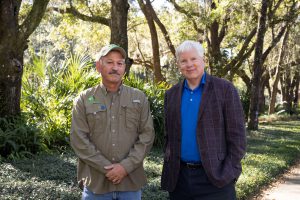By Dr. J. Scott Angle, Dr. Andra Johnson, and Ed Bravo

Trees’ little brothers are shrubs and green groundcover, but their concrete cousins include streets, sidewalks and sewers.
On Florida Arbor Day (Jan. 22), we pay homage to trees as work horses, not show horses. They cool urban heat islands, sequester carbon, shelter wildlife, and filter stormwater. There’s even been research indicating they reduce car crashes.
It’s important to treat trees as infrastructure, not afterthoughts. To plant trees strategically as we build, renovate and modernize, we need to do it with expertise. That comes from universities, where two of us lead teams of scientists, and from industry, where one of us is an accomplished nurseryman, business owner and association leader.
This expertise should be employed from the moment we decide to build. That made a big difference in Tioga, outside Gainesville, where a nurseryman was an actual partner of a developer 25 years ago.
Trees were integrated into the planning just as streets, underground utilities and sidewalks were. As a result, much damage has been avoided to those roads, underground utilities and sidewalks from tree roots. The trees’ shade has increased use of walking trails and playing fields. Their beauty has attracted visitors and their money to Tioga.
And the trees are healthy. The nurseryman’s familiarity with soil and climate conditions guided selection of trees that can live for three quarters of a century.
We shouldn’t take that for granted. Some research estimates the average lifespan of an urban tree at as little as 13 years. A USDA study says we’re losing tens of millions of trees from our cities to development, fire, hurricanes, insects and disease—and tens of millions of dollars in the payoffs of having healthy urban forests.
We need to stop treating urban trees as if they’re disposable.
There are too few city arborists. It’s a challenge to reach both professionals and homeowners with education on how to properly care for trees. In Florida we need to know more about which trees are most resilient to hurricanes so we can avoid injury to people and property.
We need to invest in the health of this living infrastructure. That means science and scientists.
For our part, the University of Florida Institute of Food and Agricultural Sciences (UF/IFAS) School of Forest, Fisheries, and Geomatics Sciences is adding faculty members with the capability of employing artificial intelligence into the study of and inventorying of urban trees. We’ve already advanced technology that allows us to count citrus trees with AI-equipped drones with 98 percent accuracy. Think of how this could help us monitor urban tree inventories.

The new UF/IFAS dean of Extension—the university’s leader of statewide outreach to deliver university-based science to 22 million Floridians—has three degrees in urban forestry. We have Extension agents active in urban forestry in Jacksonville, Tampa, Gainesville and other cities.
In private industry, the Florida Nursery, Growers and Landscape Association (FNGLA) is getting increasingly involved in weighing in on public policy regulating trees. FNGLA members have established relationships with urban planners that make it more likely that the right trees will be planted in the right places at the right times.
This nation is about to invest more than a trillion dollars in its roads, bridges, ports and tunnels. On this Florida Arbor Day, let’s not forget trees as an essential element of our infrastructure.
J. Scott Angle is the University of Florida’s Senior Vice President for Agriculture and Natural Resources and leader of the UF Institute of Food and Agricultural Sciences (UF/IFAS).
Andra Johnson is the UF/IFAS dean of Extension and director of the Florida Cooperative Extension Service. He has bachelor’s and master’s degrees and a Ph.D. in urban forestry.
Ed Bravo is a past president of the Florida Nursery, Growers, and Landscape Association, general manager and partner of Big Trees Plantation in Newberry, which designed, developed and maintains the landscaping for the Town of Tioga.
Posted
 1
1
